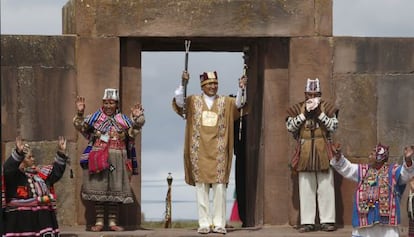Evo Morales’ party seeks to eliminate presidential term limits
The Bolivian Constitution prohibits the incumbent president from running again

Bolivia’s Movement for Socialism (MAS) wants to change the law so that Evo Morales, who began his third term as the country’s leader a few months ago, can be re-elected for an unlimited number of presidential terms.
Announced by party members and spokespeople, the initiative launches a campaign that will likely lead to a referendum to modify the Bolivian Constitution. Under the current law, Morales cannot run for another term. On Sunday, El Deber de Santa Cruz, one of the country’s leading newspapers, carried a piece headlined “The road toward indefinite re-election is paved.”
The initiative to eliminate presidential term limits began after MAS suffered major reversals in March local and regional polls
Morales and Vice President Álvaro García Linera said they were focused on their current duties and had not given thought to the issue, which needed to be decided by “popular will.” A few weeks ago, the president asked the unions of coca producers – which he continues to lead from his presidential office – to find a replacement for him. Morales predicted that finding a successor would be “difficult” because they would not only need to find a suitable candidate, but would also have to “introduce him to the people” – a process, he said, that would take a long time. However, not only did coca producers not look for a substitute, but their affiliate, the MAS in Cochabamba, approved a resolution to “work for the re-election” of Morales in 2019.
The Bolivian president is the only one who has brought up the subject of his replacement – an issue no other MAS leader ever mentions. On the contrary, more usual are the predictions saying that Morales will remain in power for a long time. The last such proclamation came from Vice President García Linera who said that “President Morales’ leadership” was one of the necessary conditions for landlocked Bolivia to win its dispute with Chile over regaining sea access.
A poll eight years ago showed Bolivians were against the measure and so it was thrown out of the new Constitution
The initiative to eliminate presidential term limits began after MAS suffered serious reversals in the last municipal and regional elections in March, especially because it was defeated in its traditional bastions of La Paz and El Alto. The party lost approximately 1.1 million votes nationwide compared with its results in the October 2014 presidential elections. García Linera told EL PAÍS in April 2015 that the main electoral challenge for the ruling elite was that “Evismo is much stronger than Masismo,” meaning that voters supported Evo Morales but did not necessarily back the candidates the president had elected to represent him.
The Constitution of 2009 only allows a president to run for two consecutive terms. In order to change the law, the Legislative Assembly must approve an amendment backed by a two-thirds majority, which MAS holds, and then submit the initiative to a popular referendum.
As well as the issue of indefinite re-election, the plebiscite is also likely to ask citizens to vote on a new way of choosing high-ranking judiciary members whose offices are currently elected by direct vote – a method that has not worked well and the government wants to change. Opposition members say MAS wants to propose a “complicated” referendum in order to camouflage the issue of Morales’ indefinite re-election. All opposition groups will likely call on their supporters to vote “no” to the measure.
The only public polls on the issue of indefinite re-election were taken eight years ago when lawmakers were crafting a new Constitution. Most Bolivians were against the measure and so it ended up being thrown out, even though MAS wanted to include it.
Since then Morales’ popularity has grown enormously thanks to economic growth, nationalist measures and redistribution initiatives. Today, he enjoys a nearly 80-percent approval rating. But he is gradually facing more adverse circumstances. Although the economy remains robust, the country has begun to feel the effects of the economic slowdown in South America.
Bolivia is following in the footsteps of Ecuador. After suffering a serious defeat in local elections, the ruling party sought indefinite re-election for Rafael Correa, though the president had initially ruled out that possibility. In Venezuela a majority eliminated presidential term limits in order to allow the now deceased Hugo Chávez to remain in power.
Translation: Dyane Jean François







































